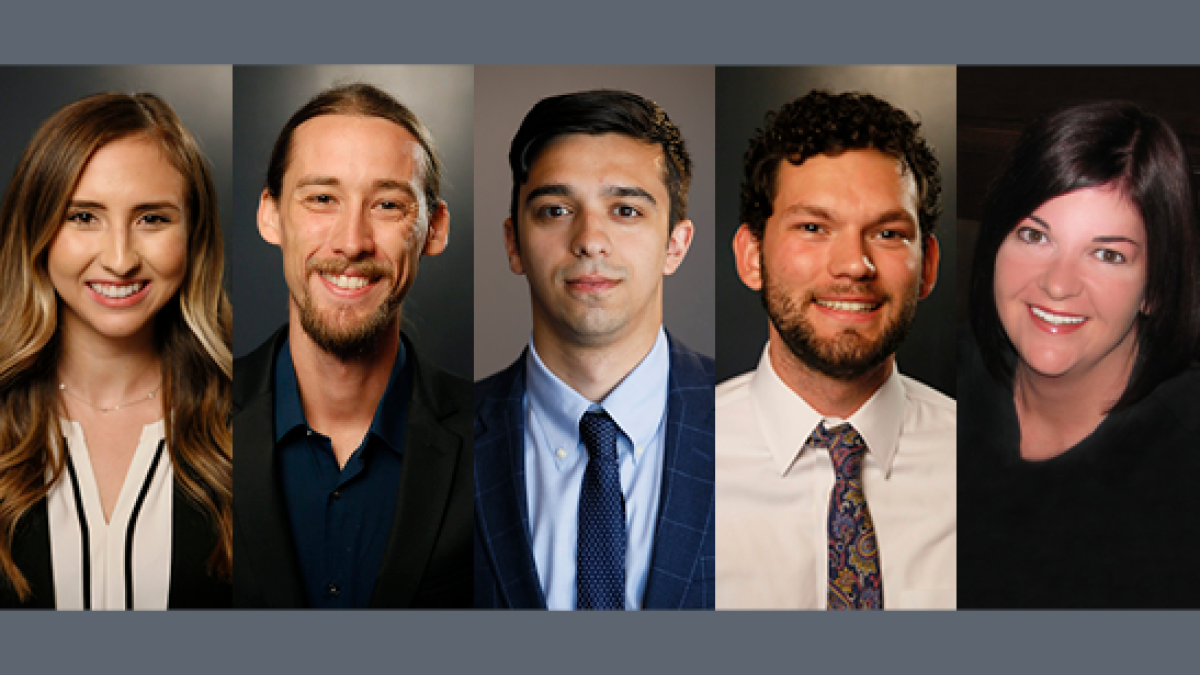ASU Law faculty, staff, community raise over $2.5 million, provide employment opportunities for students during pandemic

From left: ASU Law 3Ls Cecilia Nieto, David Campbell, Phillip Tomas, Riggs Brown and Lori Rutten are among 81 students who participated in summer internships and externships that ASU Law faculty created to provide them with paid, unique employment when other opportunities were canceled due to COVID-19.
In a world that is changing every day, the faculty of Sandra Day O’Connor College of Law at Arizona State University stepped up to support its students in multiple ways while providing the most exceptional legal education possible.
ASU Law’s generous donors, including faculty members, have contributed over $2.5 million in financial support during the pandemic. These donations have provided ASU Law students with public interest fellowships, first-generation and diversity scholarships, externship stipends, experiential learning opportunities and support for essential needs.
And over the summer when student employment opportunities were canceled or cut short due to COVID-19, ASU Law Dean Douglas Sylvester called on faculty to create innovative, paid internship and externship opportunities for students. Quickly stepping in, faculty launched a highly successful program, with 81 students participating in these special summer work opportunities while earning more than $220,000 in paid stipends from ASU Law.
ASU Law also awarded nearly $13 million in scholarships to incoming JD students for fall 2020, and the college gave more than $50,000 to students needing extra support due to COVID-19.
This support is part of ASU Law’s continuing spirit of generosity with more than $80 million in donor gifts, close to $5 million coming from faculty and staff, raised in the last decade.
ASU Law also did not increase tuition this year and has the second lowest tuition in the top 25 law schools nationally. And with three modalities for students to choose how they attend classes — in person, online or a hybrid of both — ASU Law professors are tailoring the educational experience to every student’s personal preference to provide an even more valuable environment.
“Now more than ever, our students need ASU Law to not only give them the best law school experience possible, but the genuine support of helping to ensure their personal needs are met through financial contributions, meaningful ways to engage in innovative programs inside and outside the classroom, and unique work opportunities that will position them for rewarding legal careers,” Sylvester said. “The safety and well-being of our students, faculty and staff continue to be our top priority as we work to provide the best legal education for our students.”
ASU Law faculty creates innovative, paid summer work opportunities
Diana Bowman, ASU Law’s associate dean for international engagement and co-director for the Center for Smart Cities and Regions, worked with 14 students as part of the summer internship program.
Bowman, ASU’s lead on The Connective, a collaboration of ASU, the Maricopa Association of Governments, the Greater Phoenix Economic Council, the Institute for Digital Progress and the Partnership for Economic Innovation, engaged the students in practical, problem-solving work with broader exposure to The Connective’s partners. The students’ efforts will be part of this year’s Smart Cities/Region Summit, to be co-hosted by ASU Law, ASU’s University Technology Office, the Arizona Commerce Authority and The Connective.
The students, who had the opportunity to partner with companies like AWS, Dell and Sprint, will be participating in a data exchange workshop being hosted by the Amazon Web Services Cloud Innovation Center in September.
Trevor Reed, an associate professor in ASU Law’s Indian Legal Program, was originally planning to have one or two students work with him on Native American intellectual property initiatives. When asked if he could take on more, he said, “I can take as many as you need.”
Reed’s 10-student team is developing an online handbook that will help tribal creators, artists and entrepreneurs understand their rights to the assets they create and navigate the steps necessary to register, license and potentially defend their work. The project has involved collaborating with numerous tribal artists, entrepreneurs, arts organizations and business incubators to identify specific IP needs tribal creatives have, followed by extensive legal research, tailored writing and graphic design to produce a useful resource that will serve those needs.
In addition to providing support to tribal creators, students have also begun to develop an online database of existing Native American intellectual properties currently held by museums, universities and other institutions, which tribes and their members can access to help them locate, reclaim and manage these valuable cultural assets going forward.
Victoria Ames, Arizona Legal Center president and managing partner and ASU Law assistant dean of legal projects and external engagement, initially thought the center would take on five to 10 extra students to support its massive spike in requests for help when the pandemic hit. The center ended up with more than 30 students who worked on the front lines of providing general legal information to the community, worked with Arizona Legal Center volunteer lawyers and staff to provide legal advice and assistance to callers and helped develop and present know-your-rights forums in a number of legal areas as quick reference guides for the community.
Additionally, the students worked with multiple municipalities and offices as they fielded calls from the COVID-19 hotline that the state bar and the governor’s office recently launched.
More Law, journalism and politics
Can elections results be counted quickly yet reliably?
Election results that are released as quickly as the public demands but are reliable enough to earn wide acceptance may not…
Spring break trip to Hawaiʻi provides insight into Indigenous law
A group of Arizona State University law students spent a week in Hawaiʻi for spring break. And while they did take in some of the…

LA journalists and officials gather to connect and salute fire coverage
Recognition of Los Angeles-area media coverage of the region’s January wildfires was the primary message as hundreds gathered at…

